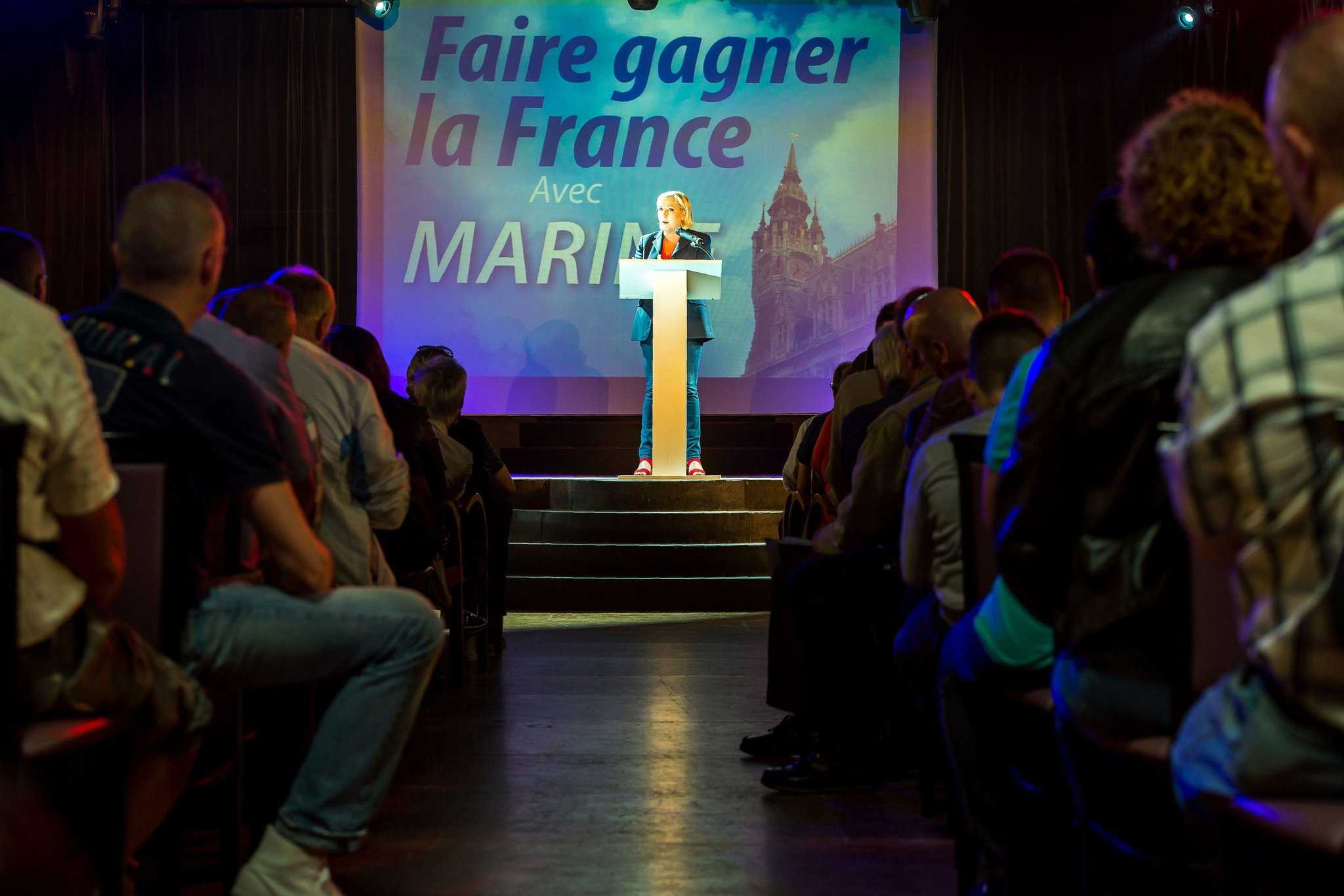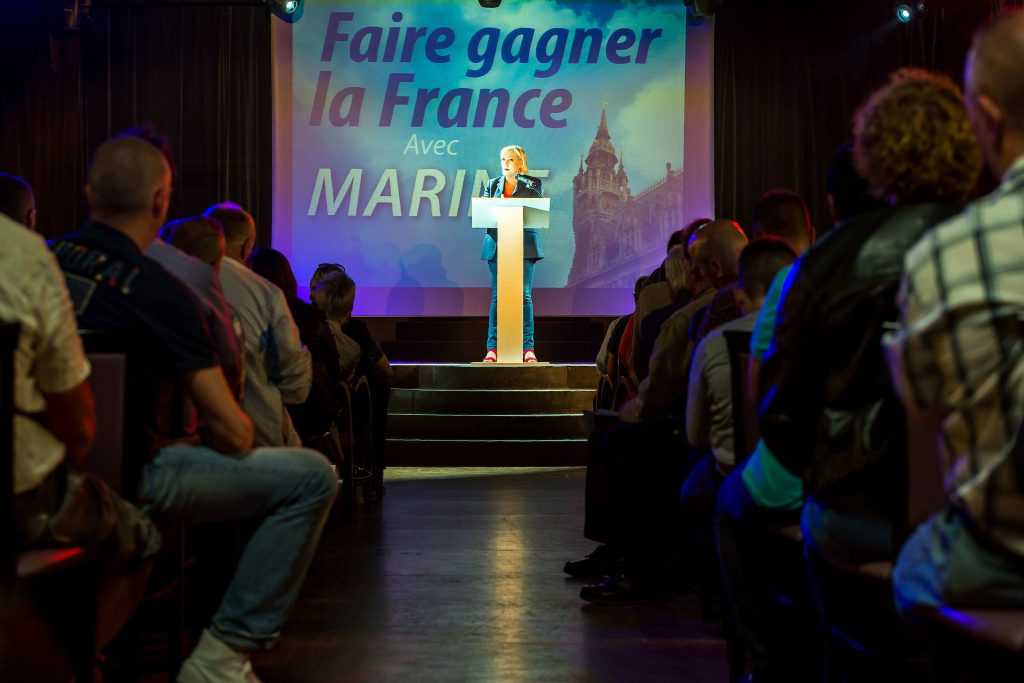
SOISSONS, France — Just this spring, Marine Le Pen’s presidential campaign drew vast crowds who enthusiastically embraced her National Front’s stridently nationalist, anti-immigrant vision of
This week in Soissons, a somnolent provincial town far from the gaudy cast-of-thousands extravaganzas of the campaign, Ms. Le Pen was greeted by a few dozen somber National Front activists in a drab meeting hall. Even hecklers didn’t bother: Just a handful of weak-voiced protesters quickly dispersed.
Ms. Le Pen’s party, crushed by Emmanuel Macron’s 66 percent in the presidential runoff in May, fared dismally in last Sunday’s legislative elections. The National Front will most likely confirm these losses in a second round of voting this Sunday. And each day brings new revelations of internal backbiting and squabbles over strategy within the Front.
It is a head-spinning turnabout that reflects, at least for now, the fizzling of Ms. Le Pen’s fortunes in France. The National Front’s retreat also adds to the impression that far-right populism is losing its appeal more broadly.
SOISSONS, France — Just this spring, Marine Le Pen’s presidential campaign drew vast crowds who enthusiastically embraced her National Front’s stridently nationalist, anti-immigrant vision of France.
This week in Soissons, a somnolent provincial town far from the gaudy cast-of-thousands extravaganzas of the campaign, Ms. Le Pen was greeted by a few dozen somber National Front activists in a drab meeting hall. Even hecklers didn’t bother: Just a handful of weak-voiced protesters quickly dispersed.
Ms. Le Pen’s party, crushed by Emmanuel Macron’s 66 percent in the presidential runoff in May, fared dismally in last Sunday’s legislative elections. The National Front will most likely confirm these losses in a second round of voting this Sunday. And each day brings new revelations of internal backbiting and squabbles over strategy within the Front.
It is a head-spinning turnabout that reflects, at least for now, the fizzling of Ms. Le Pen’s fortunes in France. The National Front’s retreat also adds to the impression that far-right populism is losing its appeal more broadly.
That retrenchment has been aided by the steady sagging of the Trump administration under an air of scandal, and the belated British realization that pulling out of the European Union may not be as fast, easy and excellent as voters were led to believe.
But whether it lasts will in no small part depend on the performance of political innovators like France’s young president, Mr. Macron, 39, a challenge that he himself has acknowledged.
Ms. Le Pen once dreamed of leading the principal opposition party to Mr. Macron and of marshaling a hundred or more parliamentary deputies to push the Front’s harsh nationalist agenda. Now she could well end up as the party’s only member of the National Assembly.
It is a lonely place to be, and it left the once-buoyant Ms. Le Pen, still looking exhausted from the sleepless presidential campaign, defensive and denouncing a “gigantic scandal for democracy” to reporters in Soissons this week.

But if the champion of France’s populist far right is now contemplating years of political marginalization, she has largely herself to blame, in the eyes of analysts as well as many in her own party. They say she is paying a bitter price for an incoherent message badly delivered.
Now her party faces a new round of painful existential questioning over what it can do to revive itself. Go left? Go right? No decisions have yet been made.
Support for the far right has close to evaporated, at least at the polls: From an already disappointing 34 percent in the May 7 presidential vote, it dropped to barely over 13 percent in last Sunday’s first-round parliamentary elections.
The Front’s voters stayed away in droves; their abstention rate was well over 50 percent, according to pollsters.
The first culprit is the Macron wave that has swept over France. The president’s field of nonpolitician amateur parliamentary candidates has touched a chord in a country fed up with established parties that brought no solutions to France’s chronic problems.
Their success has seemed to demonstrate that, given a centrist alternative to shake up politics as usual, voters will seize it and shun the extremes. Mr. Macron has blasted into insignificance not only the National Front, but the traditional right and left parties as well.
All are moaning their projected loss, not only of influence in Parliament — the once-mighty Socialists will most likely go from nearly 300 seats to a mere 20 to 30 — but of the state funding that goes with being a major party. Only about 120 Front candidates made it to the second round of voting for the 577-seat chamber.
“There’s been a recomposition of French political life,” said Jean Messiha, one of the National Front’s parliamentary candidates here in the Aisne department, a district between a state and a county. “It’s affecting us as well.”

The Aisne — poor, rural and isolated — was one of only two departments out of 101 that voted for Ms. Le Pen in the presidential election. Ms. Le Pen came here this week, 80 miles northeast of Paris, to support Front candidates in the sole department where all are in Sunday’s runoff round.
But Mr. Messiha, an economist who is considered one of the Front’s intellectuals, was parachuted by his party into the friendly Aisne and, with few local ties, is anything but a sure bet to win.
“There’s a kind of voter fatigue that has set in,” he said. “A kind of fed-upness with the whole thing. A sort of fatalism.”
Newsletter Sign Up
Thank you for subscribing.
An error has occurred. Please try again later.
You are already subscribed to this email.
View all New York Times newsletters.
- See Sample
- Manage Email Preferences
- Not you?
- Privacy Policy
- Opt out or contact us anytime
A Le Pen supporter waiting for her champion to emerge Tuesday from the low-slung Salle de la Mutualité town meeting hall on a gray back street in Soissons agreed, saying many of her Front-backing friends had not bothered to vote in the parliamentary election.
“They are just fed up with politics,” said the supporter, Jacqueline Poteau, a retired shopkeeper. “But one day they’ll cry out to the National Front to rescue them,” added Ms. Poteau, who acknowledged that “there are some foreigners I like, and some I don’t.”
Another Front voter, Didier Lefebvre, a small-business manager, said: “People were asking, ‘Why bother to vote?”’
From the start of the meeting, Ms. Le Pen did not conceal her dismay at her party’s poor performance. “Sure, it’s a little disappointing for us,” she told supporters and the Aisne’s Front candidates. “We’re not trying to hide it.”
“Part of our electorate abstained, and not a negligible part, either,” she continued. “They abstained because they think that with this unjust voting system we have been subjected to for years” — winner take all, instead of proportional — “they don’t think they will elect anybody who can represent them.”

But there is wide agreement that the Front’s problems go way beyond poor turnout. Ms. Le Pen revealed herself to be a flawed messenger for an incoherent message, even to her own supporters, in a disastrous televised debate in May with Mr. Macron, during the presidential race.
Voters were “troubled by her bad performance in the debate,” said a leading French political scientist, Pascal Perrineau. As a result, “one part of the electorate is asking, ‘Can we really have confidence in her?’” Mr. Perrineau said. “She has really lost a lot of ground.”
In part, her fumbling reflected the National Front’s deep ideological divide into at least two factions, with Ms. Le Pen an uncertain arbiter between them.
One faction insists the party needs to pursue the leftward, anticapitalist, protectionist, anti-European and anti-euro drift that Ms. Le Pen tried to push during the race, in an attempt to take voters from the Communists, Socialists and far-left France Unbowed party.
That is the line of Ms. Le Pen’s top lieutenant and strategist, Florian Philippot, who is widely hated within the party. He is a man whose political roots are on the French left and is credited by analysts with the Front’s steady electoral advances since 2011.
Another faction argues that it is madness for the Front to neglect its immigrant-bashing, xenophobic roots — the line established by Ms. Le Pen’s father, Jean-Marie Le Pen, who has been virtually excommunicated from the party, and incarnated by Ms. Le Pen’s ultraconservative niece, Marion Maréchal-Le Pen. She is stepping down from one of the two seats in Parliament currently held by the National Front, in part because she disagrees with her aunt.
“We’ve renounced our position of being the nationalist party of the right,” said Pascal Gannat, a Front veteran who is a member of the party’s political bureau, in a recent telephone interview. “So this has created a vacuum. And nor have we fulfilled our role on the left.”
“We’ve got to redefine populism. We have to define for ourselves,” he said. “Marine Le Pen was afraid of defining herself as of the right.”
“For the moment, we’re stuck” he added. “I don’t know what she wants to do. But she needs to do something. She’s blocking the Front, in some kind of archaic strategy.”
We’re interested in your feedback on this page. Tell us what you think.




























